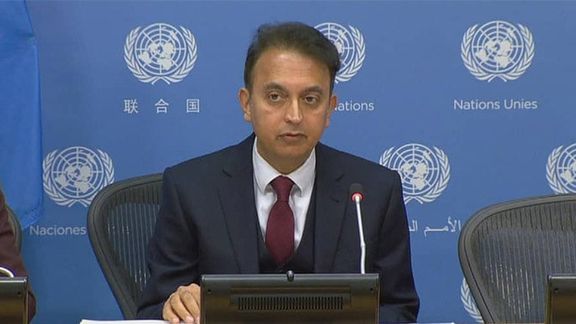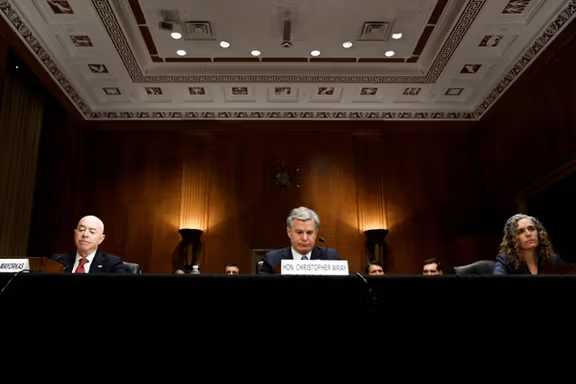Iranian Hardliner Women Vow To ‘Strike Fear’ Into Israel By Cooking Maqluba

Pro-government women in Iran are cooking the famous Levantine ‘upside down’ dish of maqluba to “instil fear” into Israel amid the war in Gaza.

Pro-government women in Iran are cooking the famous Levantine ‘upside down’ dish of maqluba to “instil fear” into Israel amid the war in Gaza.
In the latest regime campaign against its archenemy Israel which is currently fighting the Iran-backed Hamas militia, regime posters offer the “Invitation to Turn Pots to Instil Fear In Israelis”. An image shows a Palestinian woman turning a pot of rice on a platter outside Al-Aqsa Mosque in Jerusalem.
The ‘maqluba campaign’ is the latest in a string of propaganda stunts from the Islamic Republic and has been amplified following Hamas' October 7 invasion of Israel which has led to the worst war in Gaza since the proscribed terror group took over in 2007.
“Tehrani women … will express their support for mothers in Gaza by cooking the most political dish in the world,” hardliner journalist Mahdi Shakibaei tweeted while another promoter of the campaign said cooking maqluba in the heart of Tehran bears the message that “the Zionist regime is doomed to destruction.”
Meanwhile, Iranian leaders continue to issue threats to escalate the war while the regime's regional proxies in Iraq, Syria, Lebanon and Yemen continue to send attacks towards Israel and US targets in the region.
The maqluba campaign has been mocked by many of the Iranian public. “May God have mercy on us. I think Iran will have the most casualties in the defense of Gaza. First not drinking Coca Cola and Pepsi and now eating maqluba. The people of Gaza would be indebted to [Iranians] for these sacrifices till the end of time,” another sarcastic tweet said.

The UN special rapporteur on human rights in Iran, Javaid Rehman, says the Israel-Gaza War bolsters "repression" inside Iran by deflecting attention from internal criticism of the regime.
The comments come as Iran prepares to chair the UN Human Rights Council Social Forum which will come into effect today, a move which has garnered global outrage.
"Given the current crisis, they [Iran] feel even more emboldened because they believe they have succeeded in diverting attention from internal criticism and internal repression, by becoming or claiming to have become virulent defenders... of the Palestinian movement," Rehman said at a roundtable hosted by the National Union for Democracy in Iran (NUFDI) in Washington Tuesday.
Iran-backed Hamas declared war on Israel on October 7, invading by air, land and sea, and killing 1,400 mostly civilians. Another 240 were kidnapped to Gaza including babies and the elderly.
The regime has since rallied its proxies in the region to support Hamas in Gaza, with military action coming from groups in Iraq, Syria, Lebanon and Yemen since war broke out.
The UN Human Rights Rapporteur for Iran, who has never been allowed by the regime to visit the country since his appointment in July 2018, also pointed out that the leaders of the Islamic Republic had already been planning to intensify repression in the country before the war started.
Rehman also said the regime has “lost credibility” since the protests sparked by the death in custody of the 22-year-old Mahsa Amini in September 2022 that sparked protests across the country for months in the worst uprising since the 1979 revolution. Hundreds of civilians were killed by state security and tens of thousands more arbitrarily arrested, with dozens more executed.
“The problems with the existing constitutional and legal provisions are that they are subject to politically engineered criteria or the application of State ideology, which also results in the failure to engage in democratic dialogue and the inability to introduce incremental reforms,” Rehman said in his report to the UN General Assembly last week, adding that the situation had led to widespread public distrust and protests that were violently repressed.
In a letter to the UN Secretary General Antonio Guterres earlier this week, Iran's Nobel Peace Laureate Narges Mohammadi urged the UN to cancel Iran's appointment to the chair of the UN Human Rights Council Social Forum.
“The religious fundamentalist regime of Iran opposes the foundations of democracy and human rights, especially women's rights, and sees its survival in internal repression as well as creating crisis and disrupting the stability, security and peace of the region and the world,” Mohammadi wrote in her letter.
“The presidency of such a regime over the UN Human Rights Council Social Forum which is a human rights supporting body is perplexing and disappointing,” she wrote, adding that it is expected that the Islamic Republic is “decisively and with clarity removed from this position.”
Offering the position of chair also contradicts an investigation launched by the UN last year into the human rights abuses witnessed during crackdowns on protesters. The UN responded by saying "the chairmanship rotates regionally, in consistency with established UN procedures".

Commander of the Islamic Revolutionary Guard Corps, Hossein Salami, has called on a global jihad amid Israel's ongoing war against Hamas in Gaza.
Iran’s top military man known for his fiery rhetoric, declared, “Today, Gaza has created the potential for decades of revenge in the hearts of Muslims.”
"The flames of jihad [war] are now burning brightly," he said, claiming a global unity is growing against the United States which has aligned itself with Israel and supported the Jewish state's right to defend itself after Hamas militia invaded on October 7.
Salami said: "The Islamic government requires power, and the enemy only understands the logic of power…Today, we have learned that the only solution is jihad because the enemy does not understand anything else."
Salami further talked about the challenges of jihad saying “Of course, jihad is difficult, and reaching the peaks is tough.”
Iran's Supreme Leader, Ali Khamenei, and other officials have fervently praised Hamas for initiating the recent attack on Israel in which 1,400 mostly civilians were brutally murdered and a further 240 taken hostage to Gaza. Khamenei also supported the group's goal of eradicating the Jewish state.
However, the regime continues to deny any direct involvement in the attack carried out by its Gaza proxy, though it funds it to the region of $100m a year, in addition to providing technical, military and logistical support. "This was carried out by Palestinians themselves," Khamenei stated in a speech during a military event in Tehran in mid-October.

Narges Mohammadi, the imprisoned Iranian Nobel peace laureate, has called for an end to war and immediate ceasefire between Hamas militants and Israeli forces.
In a short statement published on Instagram, Mohammadi wrote: “Attacks on innocent people, hostage taking, killing of women, children and non-combatants, targeting of hospitals, missile strikes on residential areas, all have left the world in astonishment, horror and despair.”
Mohammdi slammed “religious tyranny” in Iran, adding that war and despotism are two sides of the same coin as they are both “destructive to humanity.”
Her criticism of the Iranian regime comes as many accuse Tehran of escalating tensions in the region by funding such terrorist groups as Hamas and Hezbollah.
“Lives of innocent civilians must not be sacrificed at the behest of those seeking war,” Mohammdi stressed in her message.
The Nobel peace prize laureate also urged all sides to respect human rights and “create the possibility of peaceful coexistence.”
She voiced optimism that “we can walk the path of peace, equality and freedom” with “the power of global public opinion” and “the international unity of human rights defenders and peacemakers.”
Though some people have praised Mohammadi’s call for peace, a group of activists slammed her on social media for failing to condemn Hamas’ deadly terrorist attack on Israel which claimed the lives of more than 1,400 people and left at least 5,000 wounded.
On October 6, Mohammadi won the 2023 Nobel Peace Prize. She is now serving a 12-year sentence in Evin prison in the Iranian capital city Tehran.

Tech entrepreneur Elon Musk has justified his decision to allow the likes of Iran's supreme leader on his social media platform, X as a "UN exclusion rule".
Speaking on the Joe Rogan podcast, he said: "We do have a kind of UN exclusion rule: you can have, say, the Ayatollah who would prefer that Israel didn't exist, but he's allowed to go to the UN building in New York. Generally, officials from Iran do go to the UN building even though they're a heavily sanctioned country.
"But you do want to have the leaders of countries represented on social media. You want to hear what they have to say, even if what they say is terrible."
Following a Hamas attack on Israel in early October, Musk used his X platform to call on Iran's Ali Khamenei to change his anti-Israel stance. Musk's response came in the wake of a large-scale terrorist invasion of Israel of thousands of Hamas troops which resulted in the murder of 1,400 mostly civilians and the kidnap of 240 more into Gaza.
"Khamenei’s official position is clear that the eradication of Israel is the actual goal, not just supporting Palestinians," Musk said one day after the atrocities which were the most deadly single day in Jewish history since the Holocaust.
X stated that Khamenei's post of October 8, in which he shared video footage of hundreds of festival-goers fleeing the massacre of Hamas militia had "violated" X's rules, but stated it was in the public interest to keep the post accessible.

FBI director Christopher Wray told US lawmakers on Wednesday that the Islamic Republic has tried to kill American officials, even within the United States.
Testifying in front of the Senate Committee on Homeland Security and Governmental Affairs, Wray said the regime in Iran has “mounted assassination attempts against dissidents and high-ranking current and former US government officials" either directly or by hiring criminals, and including “on American soil.”
Since October 7, when Hamas attacked Israel, Iran and its proxies have become subjects of unprecedented scrutiny in Washington.
Wray was called to testify in the Senate in the light of attacks on American forces in the Middle East, which seems to be on the rise despite repeated warnings to Iran-aligned forces from the Biden administration.
In the last two weeks, US troops in Syria and Iraq have been attacked 27 times. The Pentagon has said that it holds the Islamic Republic responsible “for all attacks.”
Reports emerged early hours Thursday of yet more attacks on US bases in Iraq.
“Explosions have been reported once again in the US Forces Bases… in Eastern Syria,” Intelligence Monitor posted on X, “This would be at least the 37th Attack on US Forces in the Middle East since October 7th.”
In his opening remarks to the Senate hearing, Wrey warned that cyber targeting of “American interests and critical infrastructure” could get worse “if the conflict expands.”
“Hezbollah, Iran’s primary strategic partner, has a history of seeding operatives and infrastructure,” Wray said, “obtaining money and weapons, and spying in this country going back years.”
Hezbollah leader Hassan Nasrollah is scheduled to deliver a speech Friday afternoon in what would be his first televised address since Hamas attacked Israel on October 7. The group’s channels have been publishing mysterious teasers of Nasrollah, giving rise to speculations that he would declare war on Israel.
President Joe Biden’s critics say his lenient approach towards Iran has emboldened the Islamic regime.
“This administration has allowed over 100 attacks in the last two years,” Congressman Mike Waltz said to Fox News. “Iran will trade the lives of its proxies in Iraq or Syria or Lebanon for American and Israeli lives. All day long. That’s a good deal for the ayatollah. Only when they feel the pain, will they stop.”
Republican Senator John Kennedy seconded Waltz sentiment in another interview with Fox News Wednesday. “Parts of the world are on fire, why is that? In part, it’s because Pres. Biden has sent every message of weakness possible to Iran, China, and Russia.”
To rectify what they see as a failure of the Democratic administration, the Republican lawmakers have drafted "the toughest Iran sanctions package ever proposed by Congress”, which would stop the Biden administration from "lifting sanctions until Iran ceases its support for terrorism," including Hamas.
“The Biden admin has failed to take actions,” wrote Senator Joni Ernst on her X, sharing a clip of Chris Rey at the Senate hearing. “My PUNISH Act will put an end to this appeasement and ensure Iran feels maximum repercussions.”
Part of the new legislative initiative is a bipartisan bill introduced by Senators Joni Ernst and Richard Blumenthal, which enables Homeland Security Investigations (HSI) to enforce oil sanctions “to cut off Iran’s funding for its terrorist proxies.”
Since 2021, Iran has increased its oil revenue by $80 billion.
Biden critics say this money has been used by the IRGC to fund Hamas, Hezbollah and other militant groups in the region. Some believe that ditching the Trump policy of ‘Maximum Pressure’ on Iran has cost the US dearly.
“The Trump administration’s decisive actions told the Iranian regime that real consequences come when you threaten the United States,” Representative Mark Green said Wednesday. “That message has been lost under the Biden administration, and our adversaries know it.
Tweet unavailable